The latest edition of The Sikh Messenger is now available:
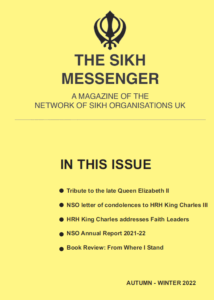

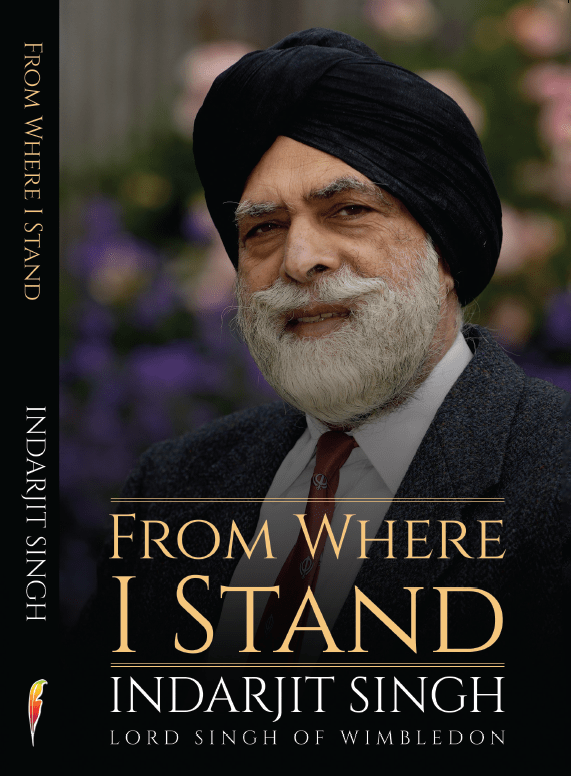
Indarjit Singh, or Lord Singh of Wimbledon is widely recognised as the de-facto leader of Britain’s Sikh community. When being introduced by the British Ambassador to Estonia, he was referred to as ‘the man who brought Guru Nanak to the Breakfast tables of Britain’, for his inspiring broadcasts on BBC Radio 4. But what’s the story behind Singh’s journey towards faith leadership? From Where I Stand reveals how his newly qualified father, Dr Diwan Singh, rallied against British rule in India, by bandaging up Sikh protestors pledged to non-violence, being beaten by police. It was, a selfless and courageous act, which led to the family’s eventual exile from Punjab to Britain. After gaining further medical qualifications Diwan Singh set up as a general practitioner overcoming prejudice of a pre-war Britain. His dynamism led him to become president of one of Britain’s first Sikh temples in Shepherds Bush, London, as well as a leading figure in the movement for India’s freedom from British Imperialism. He was popular amongst Hindu, Sikhs and Muslims – the Singh family had distinguished guests meet them at home, not least Krishna Menon who became India’s first High Commissioner to the UK after independence in 1947; and Udham Singh who later famously took revenge for the Jallianwala Bagh massacre.
Indarjit, one of 4 siblings (along with his elder brothers Gurbachan, Surinder and younger brother Jagjit), was destined to follow in his father’s footsteps of leadership. As a child growing up in wartime Britain, Indarjit was rebellious from the start. On his first day at school, he chose to avoid walking up the stairs, choosing to climb up a sandy adjacent slope – to the chagrin of his teacher and parents. During VE celebrations he went to the green grocer’s shop owned by a Mr V Pendry (a name he later used as an alias for his writing criticising the actions of the then Indian government). Referring to a 13-year-old Indarjit, the shopkeeper said, ‘you lot must be Germans because you’re not celebrating’, to which Indarjit responded in his best German accent ‘Ja’, eliciting raucous laughter amongst customers in the shop. This early sense of humour became a characteristic trait.
From Where I Stand is punctuated with seminal moments, like the time he met Kanwaljit (Lady Singh of Wimbledon) visited the pyramids of Egypt on camelback whilst on honeymoon, and the birth of the couple’s daughters. It follows his distinguished career in the mining industry. He then worked for the contractor Costain whilst also studying for an MBA. He then moved to the ‘people’s republic’ of Hackney as a management consultant. The book reveals Singh’s politics were neither left nor right, despite Bernard Weatherill MP (who later become Speaker of the House of Commons), trying to persuade him to join the Conservative party, and regardless of working as a civil servant in a far-left leaning council. During the passage of his career, Indarjit found that he was increasingly writing about religion and politics, and increasingly in the public eye, appearing on mainstream television. One TV programme called From Where I Stand was about his challenges and priorities as a Sikh in the 1980s.
It was events in India in 1984 which led Singh to take early retirement, something he was able to do because of some shrewd investments. He later set up the Network of Sikh Organisations in 1987, a leading Sikh charity for which he remains the director – and one which works for the betterment of British Sikhs. Indarjit became a leading voice of protest against the anti-Sikh genocide, which started with the military assault on Sikhism’s holiest shrine – the Golden Temple by the Indian Army in 1984.
When writing in India about earlier discrimination against Sikhs, he used the alias ‘Victor Pendry’ (his wife Kanwaljit had heard of Mr Pendry, before she met Indarjit). Now, in 1984 in the UK, writing in his own name, he challenged the then Indira Gandhi government with articles like one in the Guardian on India’s atrocities against Sikhs titled: ‘Gandhi Speak that cloaks the murderous truth’. Singh set up the Sikh Messenger promoting interfaith understanding and remains the editor today.
He has been widely celebrated for his contribution to British society and became a household name for his contributions to BBC Radio Thought for the Day. He has advised former Prime Minister’s like Gordon Brown and Tony Blair and helped set up the Lambeth Group of Faith Leaders to advise on ‘Values for the New Millennium’. A couple of years after receipt of a Broadcasting Gold Medallion, he was awarded the UK Templeton Prize for Promoting Religious Understanding – the only Sikh to have received this honour. He is one of the co-founders of the Interfaith Network for the UK and nominated as the ‘people’s peer’ in a poll of Radio 4 listeners (second only to Bob Geldof) and made a life peer in 2011.
From Where I Stand includes a selection of TFTD’s transcripts – a sentence from one perfectly sums up the core motivation of crossbench peer Lord Singh of Wimbledon – ‘…as a Sikh, I believe our own sense of wellbeing is directly proportional to the amount of our life we devote to helping those around us.’
From Where I Stand is uplifting and inspiring, and a good read for anyone interested in better understanding our fellow human beings and promoting a cohesive society.
The book can be ordered via here or via Amazon.
To order a review copy or organise an interview please reply to: info@nsouk.co.uk
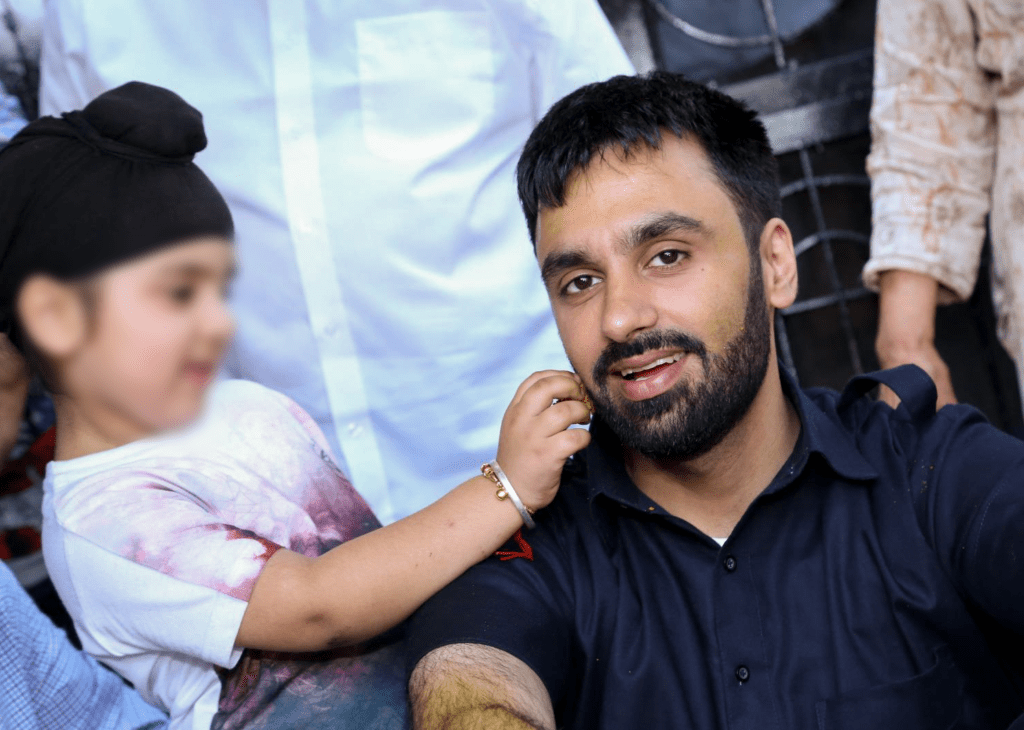
There is increasing disquiet about new developments in the case of Jagtar Singh Johal.
Human rights group Reprieve point to the unearthing of evidence that the British intelligence agencies, MI5 and MI6, may well have contributed to Johal’s detention and torture by tipping off the Indian authorities, this they say is made worse when there was indeed a real risk that Johal could be tortured or face the death penalty in India.
At the point of detention Johal was a British blogger involved with a website speaking out about human rights violations against Sikhs in India. The site for which Johal translated for – neverforget84, is in fact a reference to the year Indian troops stormed Sikhism’s holiest site, the Golden Temple. Under the pretext of flushing out ‘militants’ many innocent pilgrims were brutally murdered by the Indian army. We have every right to speak up against human riots violations in India and elsewhere – but it maybe that Britain’s spy chiefs at the behest of the British government don’t quite see it that way?
If what is alleged transpires to be true, then this is the second betrayal of Sikhs by British authorities who were revealed to have send an SAS officer to advise India in the run up to Operation Bluestar. When our director raised the persecution of Sikhs by India in 1984 with a senior government official here, he was told about the consequences speaking up would have on Anglo-Indian trade deals. In short, the British government dispensed with human rights in order to secure lucrative military contracts with India, in particular the Westland helicopter deal. In 1984 a cabinet secretary remarkably told Lord Singh, ‘Indarjit, we know exactly what is going on, it’s very difficult; we’re walking on a tightrope: we have already lost one important contract’.
If spy agencies did tip off India on Johal, perhaps Anglo-Indian trade is the motivation, but if so, what would that tell you about Britain’s priorities?
Johal’s UK lawyers Leigh Day have lodged a claim in the high court against the Foreign Office, Home Office and attorney general, which alleged that the intelligence services tipped off India despite the risks of torture. Of course, this means the government has not commented on the allegations and won’t do so whilst the case takes its passage through the courts.
Meanwhile a statement from the all-party parliamentary group (APPG) on extraordinary rendition said that if substantiated, the allegations suggested the UK had facilitated arbitrary detention and torture.
It’s co-chairs, Stephen Timms and Andrew Tyrie, said: ‘The government’s own principles on torture – designed to ensure that the UK is not involved in it – appear to have been breached. Parliament and the public cannot have confidence that the UK is not involved in kidnap and torture.’
Lord Singh of Wimbledon, Director of the Network of Sikh Organisations UK, and a Vice-Chair of The APPG for International Freedom of Religion or Belief said:
‘The UK recently hosted an international conference to emphasise the importance of freedom of belief throughout the world. Its claim to be a world leader in promoting freedom of belief and freedom of expression will be seen to be hollow if it is found to acquiesced in yet another betrayal of the Sikh community’.
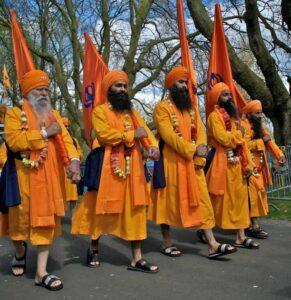
Vaisakhi, the day of the creation of the Khalsa, is one of the most important festivals in the Sikh calendar with colourful processions, bhangra dancing and displays of gatka martial arts. It is a time when we remember the courage of the five Sikhs who, in response to Guru Gobind Singh’s call, showed their readiness to give their lives for the inspiring and egalitarian teachings of the Gurus. It’s a powerful message relevant to both Sikhs and non-Sikhs in the world of the 21st century.
At Vaisakhi, Sikhs are required to pledge themselves to reflect on and uphold uplifting key Sikh beliefs. Let us remember them together. First there is belief in One God, the Creator of all that exists. Sikhs see different religions as different paths to God which should all be respected. This respect extends beyond mutual tolerance to a readiness to give our life for others to worship in the manner of their choice, as exemplified by Guru Teg Bahadur. Sikh teachings stress that no one religion has a monopoly of truth and are critical of those who argue that theirs is the only way, or that theirs is the final revelation. The Gurus also criticised all notions of caste or race in our one human family, and emphasised the dignity and full equality of women.
In Europe after the French revolution in 1789, the cry was for ‘liberty, equality and fraternity’. Nearly a century earlier, Guru Gobind Singh taught the same ideals, to which he also added the important need for humility.
Today we should pledge ourselves to eschew all factions in our community and unite as one in promoting these teachings for the benefit of our children and the wider world.
Waheguru ji ka Khalsa; Waheguru ji ki Fateh
Lord (Indarjit) Singh of Wimbledon
Dear Khalsa ji,
Waheguru ji ka Khalsa; Waheguru ji ki Fateh.
As we leave 2021 and enter 2022, it is important that we look closely at the forces and pressures that resonate in the Sikh community and reflect on how these help or hinder us in living true to our Gurus’ teachings.
The Challenges
The Sikh religion consists primarily of the teachings of the Sikh Gurus enshrined in the Guru Granth Sahib.
Our Gurus experienced several challenges to their leadership from false claimants to the Guruship seeking to use the popularity of Sikh teachings to further their own selfish interests.
Guru Gobind Singh was acutely aware that these challenges would continue after him and gave us his far-sighted injunction ‘Guru Manio Granth’. That is that we should shun those who try to bend Sikh teachings for their own ends and follow the teachings of the Guru Granth Sahib as we would a living Guru.
The Sikh Gurus incorporated writings of Hindu and Muslim saints in the Guru Granth Sahib to emphasise that no religion has a monopoly of truth. In the same way, leading Sikh scholars who compiled the 1945 Sikh Rehat Maryada also accepted the authenticity of some writings, popularly attributed to Guru Gobind Singh found in the misleadingly titled Dasam Granth (a 19th century compendium of mostly amorous exploits of gods and goddesses compiled by a Brahmin called Chiber).
PRIORITIES FOR 2022
As Sikhs we must heed Guru Gobind Singh’s clear warning about false gurus, and totally reject the siren call of sants and babas, distorting and offering questionable short cuts to the disciplined life taught by the Gurus.
As a community we must also be aware of political lobbyists here in Britain, who push an agenda which stands in contradiction to the uplifting teachings of our Gurus. Sikhism is a global world religion open to all, irrespective of race, class or any other background as the Gurus rightly intended. Those who continue to tell us we are part of some kind of ‘ethnic’ group, must be challenged and their arguments strenuously refuted at every juncture.
On the international front the NSO has supported the Indian farmers’ right to peacefully protest and briefed MPs on the developments since the farmers’ uprising against laws which not only disadvantaged them but risked their very livelihoods. We will continue to support them.
There is much work to be done, we have worked tirelessly in many areas including helping Afghan Sikhs, making sure Sikhs are included in the hate crime debate, and fighting for our right to freedom of expression. On the latter we were part of a coalition of free speech defending groups pushing back on elements of the draft Scottish Hate Crime Bill – now the Hate Crime Act. With our coalition of partners in Free to Disagree, we managed to defend free speech and get an amendment in the Bill, to allow people to freely discuss religion without censorship or fear of criminal proceedings. The fight for minority rights has been another aspect of our ongoing work, and we continue to collaborate with groups including The APPG for International Freedom of Religion or Belief to both challenge and shine a torch on those who persecute minority faiths overseas.
THE ROLE OF SIKHISM IN 2022 AND BEYOND
The Sikh religion is a strong faith rooted in compassion and common sense and has nothing to fear from discussion and questioning which can only make its teachings clearer and stronger. Our Gurus were far-sighted human beings who far from claiming special powers, warned us against superstitious beliefs and idle speculation about peripherals of belief.
Our responsibility as Sikhs is to live true to the teachings of our Gurus and make them known to a wider world which in many ways has lost its ethical direction. Many coming across Sikh teachings for the first time applaud its powerful emphasis on the equality of all human beings, gender equality respect for freedom of belief, and our responsibility to work for a just and peaceful society.
The challenge for all Sikhs in 2022 is to look beyond ourselves, and while being true to Sikh teachings, commit ourselves to living these values in serving the wider community. If we can overcome our petty internal divisions by focusing on the actual teachings of our Gurus and live the life they taught, 2022 can be an important year of unity and fulfilment for us all.
Indarjit Singh CBE,
Lord Singh of Wimbledon
Director, Network of Sikh Organisations (NSO) UK

The UN Climate Change Conference or COP26, is underway in Glasgow this week with heads of nations who face the worst impact of climate change being the most vocal about the consequences of global warming. Rising temperatures are resulting in rising sea levels and extreme weather conditions – and island nations like Barbados face serious consequences with the rise in global temperatures. Barbados Prime Minister Mia Mottley told COP26 that for Island nations like hers a 1.5C rise in global temperature, ‘is what we need to survive’, while ‘two degrees is a death sentence’.[i]
Meanwhile, speaking at the opening ceremony The Prince of Wales told world leaders and delegates that a ‘war-like footing’ is necessary to tackle the climate crisis. He said, ‘I know you all carry a heavy burden on your shoulders, and you do not need me to tell you that the eyes and hopes of the world are upon you’. He talked of the need for countries to come together for a ‘global systems levels solution’.[ii] How nations work together to solve the climate conundrum remains to be seen.
Sikh scriptures tell us, ‘Air is the Guru, Water is the Father, and Earth is the Great Mother of all’ – thus we are encouraged to respect our environment and care for our planet. We have a responsibility like others to work to combat climate change, and initiatives such as EcoSikh are both important and commendable. Whilst considering COP21 and the global climate crisis, we happened to unearth a BBC Thought for the Day broadcast by our Director Lord Singh from March 1989.
Despite being over thirty years old, it is as relevant today as it was then.
[Ends]
16 March 1989 – TFTD Lord Singh (then Dr Indarjit Singh)
There is a saying in Sikhism that ‘We love the gift but forget the giver’. The words are used in a spiritual context, but they are also true of every-day life.
I’ve long forgotten who it was that gave us a present of a re-chargeable electric toothbrush, some ten or twelve years ago. It was never really suited to the sturdy demands of the Singh family – but it did give rise to a most unusual dream.
The dream started with isolated reports about a strange and deeply upsetting noise. Doctors blamed stress and prescribed tranquilisers. But without success. The complaint became more widespread not only in this country but also abroad, and soon became the subject of major world concern.
An international conference of scientists was called to consider the situation, and, after days of intensive deliberation, came up with a solution – specially designed earmuffs to filter out the offending noise:
It worked at first, but soon people complained that the earmuffs were beginning to lose their protection and that the noise was becoming even more distressing.
In despair, a conference of religious leaders gathered and, after much discussion, concluded that the noise was in some inexplicable way, nature’s reaction to the way in which human-beings were treating each other and destroying the environment in the process. I’ll never know what happened next. At that moment, I woke up to the noise of the toothbrush holder on charge in the bedroom.
This strange dream occurred many years before the current concern over the environment. Today it’s not nature that’s making a noise of protest but people all over the world, alarmed by the potentially lethal gap in the ozone layer, the hazards from excess carbon dioxide and other known forms of pollution, too numerous to mention, as well as others still unknown, undoubtedly lurking around the corner waiting to be discovered. It all adds up to the inescapable fact that the human race is proving far too clever and short-sighted for its own good.
[i] https://www.bbc.co.uk/news/live/world-59103425
[ii] https://www.youtube.com/watch?v=xPUFxzD-D5k
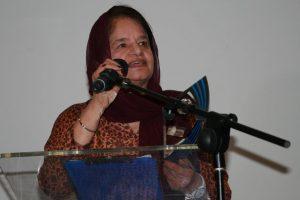
Organ Donation
Give the gift of life after your death, please talk to your family. This will give them the certainty that they need to support your decision at a difficult time. Talk about your faith, what the Gurus say.
Organ donation is when a healthy organ is given to someone who needs it. Thousands of lives are saved every year by organ transplants. For many patients in need of a transplant the best match will come from a donor from the same ethnic background. Kidney donors and recipients are matched by blood group and tissue type, and people from the same ethnic background are more likely to have matching blood groups and tissues. For other organs there is a need to match blood groups, but less of, or no requirement to match tissue types. People can donate organs and tissues whilst they are alive, but today we’re mainly going to discuss organ donation after death.
Due to a shortage of suitably matched donors, Black, Asian and minority ethnic patients often have to wait significantly longer for a successful match than white patients. If more people with these ethnic backgrounds donated their organs after death, or as a living donor, then transplant times would reduce.
Most donated organs come from people who have severe brain injury in which really important parts of the brain that are vital to maintain life are damaged. These patients receive treatment on a ventilator in an intensive care unit. When these areas of the brain become damaged, the chance of survival is very low and the patients are essentially kept alive by machines.
When all efforts to save the patient have failed, death is certified by a doctor who is completely independent of the transplant team. It is important to remember that the patient is the priority of the doctors. NHS staff are committed to saving lives; they do everything in their power to avoid the death of patients.
A panel of doctors have to declare the deceased as brain dead before the organs can be taken out. People who die of natural causes are usually not able to donate, because the donor’s heart must be beating recently for the organs to remain alive and viable for transplantation.
Organs that can be donated by people who have died include the heart, lungs, kidneys, liver, pancreas, and small bowel. Tissues such as skin, bone, heart valves and corneas also can be used to help others. One donor can help save up to 50 lives. During organ donation, the donor is kept alive by a ventilator, which their family may choose to remove. When organs are removed by the medical team, the body remains as intact as possible. The removal of organs is carried out with the greatest care and respect. The family can see the body afterwards and staff can contact the religious leader if the family wishes.
There is no age limit for organ donation. The oldest donor was 92 years old in the USA, in May 2020. There are a few certain conditions that will limit patients from donating, but the doctors will be aware of this at the time of donation. You can find out more information on the NHS website.
England has an opt-out system. This means that all adults in England have agreed to potentially become an organ donor when they die and can choose to opt-out if they wish. However, just because you’re on the register it doesn’t mean that when you die your organs will automatically be donated. At the time of death, the family is always involved in the decision and their consent is still needed in order for organs to be donated. It is therefore really important that you discuss the possibility of organ donation with your family beforehand, so that they are informed of what happens and are aware that this is a possibility.
At the time of death, the family will likely be processing a lot of thoughts and there is only a short window in which to donate, so a conversation beforehand is of utmost importance. It is a difficult and emotional conversation to have but will potentially save many lives. You can find out more information on the NHS website and by talking to your doctor.
Sikh teachings about organ donation
The Sikh philosophy and teachings place great emphasis on the importance of giving and putting others before oneself.
Importance of service
ਮੁਇਆ ਗੰਢ ਨੇਕੀ ਸਤੁ ਹੋਇ। p 143 Guru Granth Sahib (heron inward GGS)
The dead sustains their bond with the living through virtuous deeds
The true servants of God are those who serve Him through helping others.
Death
There is only one certainty that physical life comes to end. Life is grounded in death. Death is the natural progression of life.
ਸਭੁ ਜਗੁ ਬਾਧੋ ਕਾਲ ਕੋ p 595 GGS
The world is tied under the sway of death.
ਮਰਣੁ ਨ ਜਾਪੈ ਮੂਰਤ ਪੁਛਿਆ ਪੁਛੀ ਥਿਤ ਨਾਂ ਵਾਰ p 1244 GGS
Death comes without asking any date or fixing any time.
ਪਵਨੈ ਮਹਿ ਪਵਨ ਸਮਾਇਆ ਜੋਤੀ ਮਹਿ ਜੋਤਿ ਰਲਿ ਜਾਇਆ
ਮਾਟੀ ਮਾਟੀ ਹੋਈ ਏਕ। p 885 GGS
Like breath merges in the air, the soul joins the bigger soul, the dust becomes one with dust.
ਪਾਂਚ ਤਤ ਕੋ ਤਨੁ ਰਚਿਓ ਜਾਨਹੁ ਚਤਰ ਸੁਜਾਨ
ਜਿਹ ਤੇ ਉਪਜਿਓ ਨਾਨਕਾ ਲੀਨ ਤਾਹਿ ਮੈ ਮਾਨ p 1426 GGS
O clever wise man know that the body is made up off five elements. Be sure says Nanak that thou shall blend with, from whom thy hast sprung.
ਉਦਕ ਸਮੁੰਦ ਸਲਲ ਕੀ ਸਾਖਿਆ ਨਦੀ ਤਰੰਗ ਸਮਾਵੀਗੇ ਸਮਦਰਸੀ ਪਵਨ ਰੂਪ ਹੋਇ ਜਾਵਹਿਗੇ p 1103 GGS
Like water in the water of the sea and the wave in the stream, I shall merge with God. Meeting with the supreme soul, my soul shall become impartial like the air.
The Sikh faith stresses the importance of performing noble deeds. There are many examples of Sikhs doing selfless service such as giving free food, groceries, and oxygen to the victims of coronavirus COVID-19.
‘It is entirely consistent with the spirit of service that we consider donating organs after death to give life and hope to others. In my family we all are for donating organs after death and would encourage others to do so.’ Right Honourable the Lord Singh of Wimbledon CBE, Director Network of Sikh Organisations, UK
Donating one’s organ to another so that the person may live is one of the greatest gifts and ultimate seva to humankind.
Seva or selfless service is at the core of being a Sikh: to give without seeking reward or recognition and know that all seva is known to and appreciated by the Eternal. Seva can also be donation of one’s organ to another. There are no taboos attached to organ donation in Sikhi nor is there a requirement that a body should have all its organs intact at or after death. Physical body is only a vassal in its journey, left behind and dissolved into elements.
‘One of Sikhism’s most basic messages-as advocated by Guru Nanak is for a human being to be of service to humanity. I believe every Sikh who has understood and inculcated this aspect of spirituality would consider his or her greatest honour to be of use to another human being in death. It certainly would be for me.’ Says Sikh scholar and writer, Dr Karminder Singh.
I end with the wisdom of our Guru, the Guru Granth Sahib:
ਨਰੂ ਮਰੈ ਨਰੁ ਕਾਮਿ ਨ ਆਵੈ।। ਪਸੂ ਮਰੈ ਦਸ ਕਾਜ ਸਵਾਰੈ p870 GGS
When a human being dies, does not help anyone, but when an animal dies, serves many purposes.
On the inference members of the House of Lords are indifferent to the plight of Jagtar Singh Johal
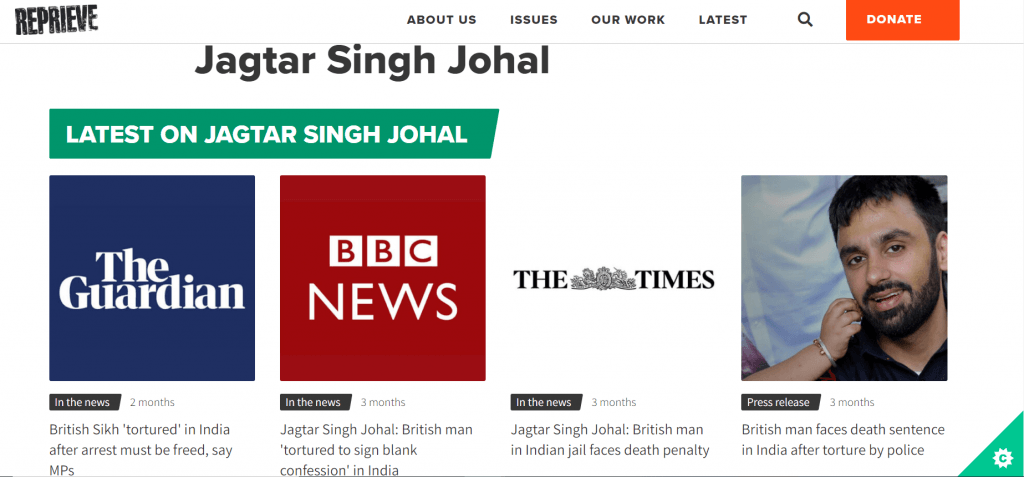
(above) screenshot from Reprieve’s website:
Jagtar Singh Johal
‘To ask Her Majesty’s Government what representations they have made to the government of India concerning the arrest of UK citizen Jagtar Singh Johal; and what response, if any, they have received.’
‘The British High Commission has raised this case with the Indian authorities. Following high level lobbying, consular staff visited Mr Johal on 16th November. The Rt Hon Field, the Minister for Asia and the Pacific met with Mr Johal’s MP and brother on 27 November. We will continue to raise this case with the authorities to ensure we have regular and full consular access.’
Answered 27 November 2017, By Lord Ahmad of Wimbledon (Conservative, Life peer)
In February this year Reprieve got in touch with Lord Singh and other peers to request support for a letter to the Foreign Secretary raising the alarm about India’s treatment of Jagtar Singh Johal. Lord Singh and some of his fellow crossbenchers signed the letter and are continuing to work with Reprieve and others moving forwards.
The Sikh Federation UK is the successor group to a formerly banned extremist organisation. It does not help Mr Johal to have them speaking for him.
[ENDS]
Network of Sikh Organisations